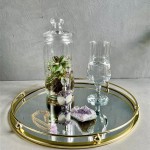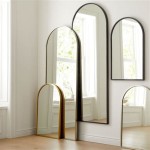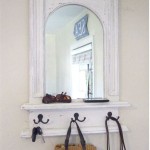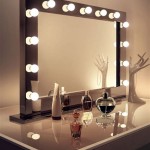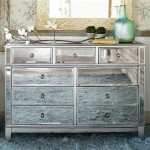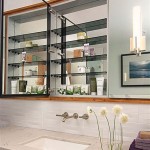Should You Hang A Mirror Over Your Couch?
The decision of whether to hang a mirror over a couch is a multifaceted one, involving considerations of aesthetics, functionality, and the overall impact on a living space. While mirrors are often lauded for their space-enhancing and light-reflecting properties, their placement requires careful planning to achieve the desired effect without creating visual dissonance or negatively impacting the room's atmosphere.
A mirror placed strategically can undoubtedly transform a room, expanding its perceived size, brightening the space, and adding a touch of elegance. However, an ill-considered placement can lead to unwanted reflections, awkward visual angles, and a feeling of unease. Therefore, before reaching for the hammer and nails, it is crucial to evaluate several key factors that will determine whether a mirror above the couch is the right choice for a particular space.
Assessing the Room's Natural Light
One of the primary benefits of hanging a mirror is its ability to amplify natural light. A mirror positioned opposite a window will reflect incoming sunlight, effectively doubling the illumination within the room. This is particularly advantageous in smaller spaces or rooms with limited natural light sources. The reflected light can make the room feel more open, airy, and welcoming.
However, it is essential to consider the direction and intensity of the sunlight. If the couch is positioned in direct sunlight, a mirror reflecting that light could create glare, making the seating area uncomfortable and straining the eyes. In such cases, it might be more effective to position the mirror on a side wall to indirectly reflect light or to choose a mirror with a slightly tinted surface to reduce glare.
Furthermore, the existing lighting fixtures in the room should be considered. A mirror reflecting artificial light can create an interesting ambiance, especially with strategically placed lamps. However, excessive reflection of artificial light can also result in an overwhelming or artificial feel. Experimentation with different lighting scenarios is recommended to determine the optimal effect before permanently installing the mirror.
The color palette of the room also plays a crucial role in how light is reflected. Light colors will naturally reflect more light, while dark colors will absorb it. A mirror in a room with predominantly dark colors can provide a much-needed boost of brightness, whereas in a room with already abundant light and light colors, the effect might be less dramatic or even unnecessary.
Evaluating the Mirror and its Placement
The size and shape of the mirror are critical factors influencing its overall impact on the room. A large mirror, spanning a significant portion of the wall above the couch, can create a dramatic statement and significantly enhance the sense of spaciousness. However, it can also be overwhelming if the room is already small or cluttered.
A smaller, more decorative mirror can serve as an accent piece, adding visual interest without dominating the space. Multiple smaller mirrors arranged in a gallery wall formation can also be an effective way to create a focal point above the couch. The shape of the mirror should complement the style of the room and the surrounding furniture. For example, a rectangular mirror might be well-suited for a modern, minimalist space, while an ornate, antique mirror could add character to a more traditional setting.
The height at which the mirror is hung is also important. Generally, the bottom of the mirror should be positioned a few inches above the top of the couch. This ensures that it is easily visible and that it reflects the room in a balanced way. However, the exact height may need to be adjusted depending on the size of the mirror, the height of the ceiling, and the overall proportions of the room.
Consider what the mirror will reflect. Ideally, it should reflect something aesthetically pleasing, such as a window with a view, a striking piece of art, or a well-decorated part of the room. Avoid placing the mirror so that it reflects clutter, a blank wall, or an unsightly view. An undesirable reflection can negate the positive effects of the mirror and create a feeling of unease.
Considering Aesthetics and Room Functionality
Beyond its practical functions of light reflection and space enhancement, a mirror can serve as a powerful design element, contributing significantly to the overall aesthetic of the room. The frame of the mirror can be chosen to complement the room's color scheme, furniture style, and overall design theme. A sleek, modern frame can enhance a contemporary space, while a rustic wooden frame can add warmth and character to a more traditional room.
The placement of the mirror should also consider the functionality of the room. In a living room, the couch is typically the primary seating area, and the area above it often serves as a focal point. Hanging a mirror above the couch can draw attention to this focal point, creating a visually appealing and balanced composition. However, it is important to ensure that the mirror does not interfere with other activities that take place in the room. For example, if the couch is used for watching television, the mirror should not reflect the television screen, as this can create glare and be distracting.
Furthermore, the presence of other decorative elements in the room should be taken into account. If the wall above the couch is already adorned with artwork, shelves, or other decorative items, adding a mirror might create a cluttered and overwhelming effect. In such cases, it might be more effective to choose a smaller, more understated mirror or to consider placing the mirror on a different wall.
The style of the couch itself can influence the choice of mirror. A low-backed couch might be better complemented by a taller, more vertical mirror, while a high-backed couch might benefit from a wider, more horizontal mirror. The color and texture of the couch upholstery should also be considered when selecting the mirror frame. A mirror with a frame that complements the couch's color and texture can create a cohesive and harmonious look.
Ultimately, the decision of whether to hang a mirror over the couch is a matter of personal preference and the specific characteristics of the room. By carefully considering the factors outlined above, including the room's natural light, the size and placement of the mirror, and the overall aesthetics and functionality of the space, one can make an informed decision that will enhance the beauty and comfort of the living area.

What To Hang On The Wall Over Your Sofa Closetful Of Clothes

Tips On Hanging A Mirror Over Furniture C Home Limited
:strip_icc()/cdn.cliqueinc.com__cache__posts__189779__large-round-mirrors-189779-1528326128816-main.700x0c-6e62240fb50344ed8626b2537ad786fa.jpg?strip=all)
30 Ways To Style Large Round Mirrors

Console Tables And Round Mirrors A Perfect Combination

What To Hang On The Wall Over Your Sofa Closetful Of Clothes

Do S And Don Ts For Hanging Your Mirrors Artwork The Seattle Times
:strip_icc()/KatherineCarterDesign-3f8b299498274f03953732ece7b6e188.jpg?strip=all)
10 Feng Shui Mirror Rules According To Experts

What To Hang On The Wall Over Your Sofa Closetful Of Clothes
:strip_icc()/Designer_KatieHackworthPhotographer_BelatheePhotography1-5ec16af89e9242cabd3c637c7eb23d4b.jpg?strip=all)
10 Feng Shui Mirror Rules According To Experts

A Guide For Knowing What To Hang Above Your Sofa And How Execute
